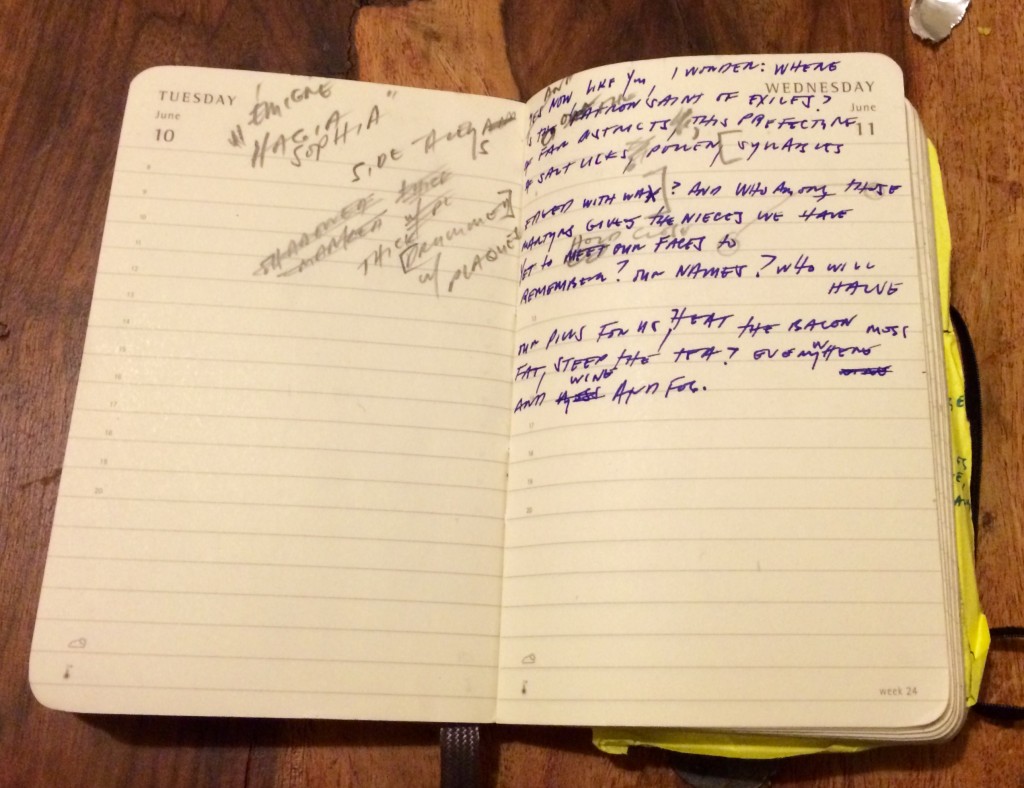Prac Crit
Saudade
by R.A. Villanueva
Deep Note
by R.A. Villanueva
- There is a moment in Alice Fulton’s Feeling as a Foreign Language: The Good Strangeness of Poetry that’s been going off in my skull like a flare. In it, she suggests: ‘Each poet creates an expatriate space, a slightly skewed domain where things are freshly felt because they are freshly said.’ And right before that, Fulton muses: ‘Of course, the impulse to create language commensurate to – and transcendent of – meaning is the driving force of poetry.’
- I first encountered those two sentences in a photocopied excerpt I lost a long while back. In the intervening years between reading that passage and rediscovering its source, I didn’t know the exact phrasing. All I had was its cadence and pulse and that strange adjective, ‘expatriate.’
- I want to believe that the contours of that thought and the brightness of that word (as adjective and noun and verb) casts colors of wavering shades upon my move to London. I want you to hear how ‘expatriate’ is just a Latinate way to soothe rootlessness and temper loss. I want to make sense of knowing home will forget me no matter what I try.
- This is an early draft of ‘Saudade’ from my notebook. It’s a kind of preparatory sketch dated June, 2014, about a month before I left Brooklyn. Reading it now, it’s enlightening to see what’s already there: its litany of questions; its vernacular of intimacy and absence; its unfinished quatrains and rhymes like a ghost-sonnet reaching for shape.
- This is my favorite photo of my niece. I think of her often – how she doesn’t really know me except as a digitized version of me. I am to her a floating head making faces, detached from my body and hers, narrating antics and calling out her name from behind touch-sensitive glass.
- The imagined ‘you’ of the poem is a stranger – a young expat on Twitter who would write nearly every day about teaching English in a Japanese prefecture she never named. Before she closed her account, there were photos of her students’ syntax exercises and practice sentences, karaoke nights with her co-workers and hosts, bottles of wine; there were lovelorn one-liners, screen shots of poetry salvaged from used bookstores, mistranslations as ink drawings.
- One morning, her stream of posts grew Michigan-haunted. It became a heartsick ode to the peninsulas of home, to Grand Marais and the unbroken cold of Lake Superior, who ‘seldom gives up her dead.’ She wrote in bursts about the clarity of those waters, their near-mystical hold upon ships’ hulls lost to storms.
- This will be me when I go away, I found myself thinking.
- And I found myself thinking, too, of Tara Isabella Burton: ‘Nearly every historic city has its brand of melancholy indelibly associated with it – each variety linked to the scars the city bears. Lisbon has its saudade: a feeling of aimless loss tied to the city’s legacy of vanishing seafarers, explorers shipwrecked in their search…’
- And terrified, I found myself thinking of Joy Williams: ‘Language accepts the writer as its host, it feeds off the writer, it makes him a husk… The writer is never nourished by his own work, it is never satisfying to him. The work is a stranger, it shuns him a little [and the] writer must do all this alone, in secret, in drudgery, in confusion, awkwardly, one word at a time.’
- As with the Catalan, ‘enyorança,’ and the Welsh, ‘hiraeth,’ there is no exact way to render the Portuguese, ‘saudade,’ into English.
- ‘Impossible, yes,’ a woman after a reading once needed me to understand, ‘because ‘saudade’ is here and here and here.’ She hummed those italics, pressing upon her ribcage, her waist, the inside of her wrists. She meant her heart, her guts, her veins. As if the word wasn’t something to translate into precise terms, but was, instead, something inherited, transmitted, felt in the body. ‘Saudade’ must be bruise and balm, nerve and home.
- Here we are remembering a pain we love, a want for something that might have happened, a place that’s gone.
- Here we are with a sigh in the marrow, writing dispatches from this borderland of hyphens and magpie songs.
The poet’s notebook [back]

The poet’s niece [back]

Saudade
by R.A. Villanueva
Yes now, like you, I wonder: where
is the patron saint of exiles
and far districts, this prefecture
of salt licks, pollen? Of alleys
blue with plaques? And who among those
martyrs gives the nieces we have
yet to hold close our faces to
learn, our names to try? Who will halve
our pills for us, heat the bacon
fat, steep the tea? Everywhere wine
and moss. Everywhere fog. The wrecks
of ships around the Whitefish Point
and bodies the lake won’t give back,
you say: like that – a love like that.
First Published by Prac Crit.
Related articles
Vahni Capildeo
“I sometimes feel, when entering a space…that I’ve already been constructed as something. Then, no matter what I say, or how I feel the situation could evolve, I’m imprisoned in supposedly speaking ‘as a’ medievalist, or Trinidadian, or woman.”
1. Cities in Step 2015
Interview by Eve Lacey2. La Poetessa 2013
Essay by Sandeep ParmarHenri Cole
“Eventually, I began writing terser, airier, vertical poems, with three or four stresses per line. But not in quatrains, because I had this irrational fear, from living in Japan, where there’s tetraphobia, that four is a number that might lead to death.”